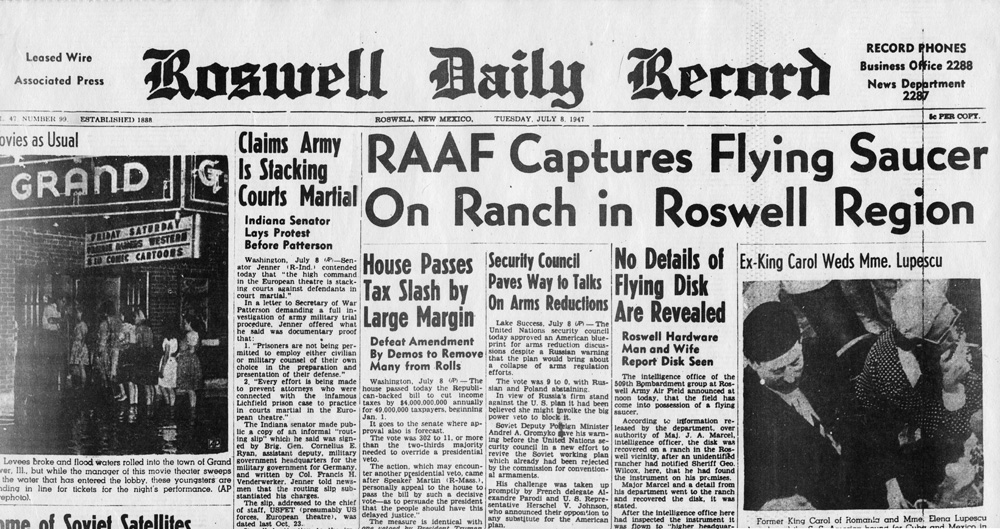The Conspiracy of Rules

This week we celebrate the 65th anniversary of the Roswell crash landing, a watershed event for conspiracy theorists everywhere. I sympathize with the hapless Air Force officers looking at the wreckage of their high-altitude weather balloon, the glass, rubber, and metal strewn around, probably including a reflective saucer-shaped instrument shell, and having to explain within the bounds of military secrecy what happened that night, only to be met with the suspicion of people wearing tin-foil hats. The chagrin of those officers must have turned to alarm as the fallen balloon was figuratively resurrected, and the flying saucer took off as one of the enduring stories of our time: A crash landing by stray aliens being covered up by the U.S. government for its own nefarious, if unspecified, purposes.
The reason I can easily sympathize with the government on this is because I have seen an even bigger conspiracy theory that I personally know to be equally ludicrous—the conspiracy of corporate leaders to control the U.S. political and economic machinery to their personal benefit. A whole phalanx of academics, journalists, and elected officials has benefited from the public’s credulous acceptance of this theory, especially with regards to executive pay.
Lest I be accused of creating my own anti-“corporate conspiracy” conspiracy theory, let me quickly add that each of these parties has participated in their part of the anti-corporate crusade according to their own particular incentives, i.e., to publish in select journals, sell newspapers or airtime, or win higher elected office. No coordination was necessary to blow this balloon beyond what reality could contain.
The reality is that corporate executives can barely conspire to keep their own firms competitive in the capital markets, or to prevent the passage of some of the most inane and insanely complex legislation dreamed up by modern man. In addition, the anti-corporate crusade has glommed around a proposition so silly that it can only be taken seriously by the tin-foil-hat set: The idea that America would work better if corporations were run as democracies. Imagine Walt Disney putting the purchase of a vast tract of central Florida swampland to a vote, or Steve Jobs asking his shareholders what they thought of creating a bet-the-company music ecosystem. One strategic HR decision—executive compensation—is already put to a vote, with no discernable effect on CEO pay, but with plenty of unintended consequences, most of them costly to investors.
Those who have never run a business might be forgiven for thinking that “corporate democracy” could work just fine. Those of us who manage businesses, or work with actual companies, know it is bonkers. Proponents of corporate democracy figure that what is good for government ought to be good for companies. But can you imagine how much more politicized, dysfunctional, and costly our government would be if every legislator were up for election every single year? Yet annual election of all directors is a darling of the corporate democracy movement.
Investors know that a somewhat less democratic regime is not necessarily bad, as evidenced by studies showing how they have voted with their dollars on issues dear to the corporate democracy reformers. Many investors know history well enough to recall that about 80 percent of all wealth creation in this country has been driven by “imperial” or “unaccountable” CEOs: think Rockefeller, Ford, Disney, Gates, etc.
We put the term “unaccountable” in quotes because the critics’ definition of accountability is derived from the grade school view of someone disappointing their appointed scold, apologizing, and promising to behave better in the future. The world of ‘intrepid’ reporters, tenured academics or entrenched political incumbents may work that way, but the business world is not so tame. Universities and governments can only be reformed from within. Sure, controlling investors with good business sense can change and adapt the companies they control to great effect, but that is very different from imposing one-size-fits-all rules on every company. When looking at our corporate market as a whole, we see companies of every size come and go with impressive frequency as a result of shareholders voting with their dollars; better-governed companies replace poorer governed ones all the time. In other words, natural selection among numerous governance regimes in the market for capital is an effective accountability mechanism, far more effective than the successive deformations of existing institutions by people guessing what will work best in a rapidly changing environment. Most governance reformers are much more willing to bet on creationism than evolution in the capital markets.
That the theory of “managerial power” was ever taken seriously is, for me, a much greater mystery than what happened at Roswell. This was basically a conspiracy theory holding that CEO pay rapidly grew as a result of the sway that management had over their board colleagues. Yet this leap in pay took place over a period when power decidedly shifted away from management toward independent directors.
The best evidence about whether a theory is good or not is by the effectiveness of the changes that have been implemented using the theory. The theory of “managerial power” spawned numerous reforms in executive compensation. Yet, after all those reforms, CEO pay remains high and has continued to go up. Even the critics recognize the failure of that effort. You would think they would check their theory, but they see the failure of their reforms as more evidence of a conspiracy, and therefore as justification for even more rules. That’s how conspiracy theories work.

Add A Comment